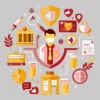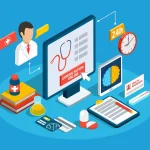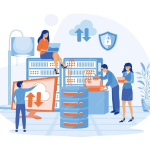
Computer Software Used In Hospitals: Enhancing Healthcare Efficiency And Patient Care
In the fast-paced world of modern healthcare, hospitals rely heavily on computer software to streamline operations, enhance patient care, and optimize administrative processes. These digital solutions have become an integral part of the modern medical facility, supporting various critical functions.
As the healthcare industry continues to evolve, innovative companies are developing cutting-edge solutions to address emerging challenges. In this blog, we will be discussing some of the top computer software used in hospitals and other healthcare facilities. From electronic health records to systems for medical imaging, we will cover all types of essential tools that help streamline the tasks in the hospital.
Types Of Computer Software Used In Hospitals
Hospitals rely on a variety of specialized healthcare software to manage different aspects of their operations. Here are some key types:
1. Electronic Health Records (EHR) Systems
EHR systems are central to modern hospital operations. They allow healthcare providers to digitally store patient feedback, streamline workflows, and ensure accurate and accessible patient information.
2. Hospital Information Systems (HIS)
HIS integrates EHRs with administrative and financial systems. They manage patient information, scheduling, billing, and inventory management, providing a comprehensive solution for hospital management.
3. Picture Archiving and Communication Systems (PACS)
PACS software is used for storing and retrieving medical images such as X-rays, MRIs, and CT scans. It enables healthcare providers to view and share images across departments and with external specialists.
4. Clinical Decision Support Systems (CDSS)
CDSS software assists healthcare providers in clinical decision-making by providing evidence-based guidelines and patient-specific recommendations, helping to improve patient outcomes and safety.
5. Telemedicine Software
Telemedicine software facilitates remote consultations between healthcare providers and patients, allowing for virtual visits, remote monitoring, and telehealth services.
6. Practice Management Software (PMS)
PMS helps healthcare providers manage daily operations, including appointment scheduling, billing, and administrative tasks, streamlining practice workflows.
7. Patient Portals
Patient portals allow patients to access their health information online, communicate with healthcare providers, request prescription refills, and schedule appointments.
8. Laboratory Information Management Systems (LIMS)
LIMS manages laboratory operations, including sample tracking, test results, and data analysis, advantages of LIMS include improving efficiency and accuracy in lab environments.
9. Pharmacy Management Systems
Pharmacy management systems handle prescription dispensing, inventory management, and medication tracking, ensuring safe and efficient pharmacy operations.
10. Radiology Information Systems (RIS)
RIS manages radiology workflows, including patient scheduling, imaging procedures, results reporting, and billing, integrating with PACS for comprehensive radiology management.
11. Health Information Exchange (HIE) Systems
HIE systems facilitate the secure sharing of patient health information between different healthcare organizations, enhancing care coordination and patient outcomes.
12. Remote Patient Monitoring (RPM) Systems
RPM systems enable continuous monitoring of patient’s health conditions using connected devices, allowing for early intervention and improved chronic disease management.
13. Medical Billing Software
Medical billing software streamlines the billing process by automating claims submission, tracking payments, and managing patient accounts, reducing administrative burdens.
14. Clinical Trial Management Systems (CTMS)
CTMS supports the planning, tracking, and management of clinical trials, ensuring compliance with regulatory requirements and enhancing the efficiency of trial operations.
15. Electronic Prescribing (eRx) Systems
eRx systems allow healthcare providers to electronically prescribe medications, reducing prescription errors, and improving patient safety and medication adherence.
Benefits Of Computer Software Used In Hospital
Computer software for healthcare in hospitals offers numerous advantages, from automating tasks to improving patient care. Here are some key benefits:
1. Streamlined Operations
Hospital software systems automate routine tasks like scheduling and billing, reducing the administrative burden on healthcare providers and allowing them to focus more on patient care.
2. Improved Patient Care
Access to comprehensive Electronic Health Records (EHRs) and Clinical Decision Support Systems (CDSS) improves diagnostic accuracy and treatment planning. EHRs provide up-to-date patient information, while CDSS offers evidence-based recommendations.
3. Enhanced Efficiency
Hospital Information Systems (HIS) and Picture Archiving and Communication Systems (PACS) streamline administrative tasks and improve resource allocation. HIS integrates various functions into a single system, while PACS enables efficient storage, retrieval, and sharing of medical images.
4. Patient Engagement
Telemedicine software enhances patient access to care by allowing remote consultations and virtual visits. This technology improves the importance of patient satisfaction and engagement, especially for those in rural or underserved areas.
5. Cost Savings
Efficient use of resources and reduced administrative costs contribute to overall cost savings for hospitals. Automation reduces the need for additional administrative staff, while improved efficiency in patient management minimizes waste.
Challenges And Considerations Of Hospital Software Systems
As discussed above, there are various advantages of using computer software in hospitals. However, implementing computer software for healthcare in hospitals comes with some challenges, like:
1. Cost: Initial setup and ongoing maintenance can be costly, including purchasing licenses, hardware, and customization, plus recurring expenses for updates and support.
2. Integration: Ensuring different software systems work together seamlessly is complex and crucial to avoid data silos and inefficiencies.
3. Data Security: Protecting patient data from cybersecurity threats and maintaining HIPAA compliance is essential to prevent data breaches and ensure privacy.
4. Training: Adequate training for healthcare staff is vital to ensure they can use the new healthcare software effectively, requiring comprehensive and ongoing education.
Conclusion
In conclusion, healthcare software systems are essential for enhancing efficiency, improving patient care, and supporting decision-making processes. From patient record management to performing any critical diagnosis, almost every type of software is now available in the market to help maintain the quality in hospitals. Using these digital solutions has become an important element of modern healthcare systems to deliver accurate results most efficiently.
Frequently Asked Questions (FAQs)
What Software Do Hospitals Use?
The major types of software that hospitals use include Electronic Health Records (EHR) systems for managing patient data, Hospital Information Systems (HIS) for integrating administrative and clinical functions, and Picture Archiving and Communication Systems (PACS) for storing and sharing medical images. These software solutions enhance efficiency, patient care, and data management.
What Are The Benefits Of Hospital Information Systems (HIS)?
HIS integrates various functions like patient information, scheduling, billing, and inventory management, improving operational efficiency and patient management.
What Should Hospitals Consider When Choosing Software Solutions?
Hospitals should consider integration capabilities, scalability, ease of use, and compliance with healthcare regulations when choosing software solutions.
What Should Hospitals Consider When Choosing Software Solutions?
Hospitals should consider integration capabilities, scalability, ease of use, and compliance with healthcare regulations when choosing software solutions.
Enhance Patient Care and NABH Compliance with LazyMonkey
LazyMonkey is your all-in-one solution for improving patient care, retaining more patients, and meeting NABH standards. Our powerful QR-based feedback tool enables you to capture real-time insights from patient feedback, discharge surveys, staff and doctor evaluations, and clinical research, while also streamlining inter-departmental communication.
Transform your healthcare facility today - reach out to us at hello@lazymonkey.in, or request a demo here!
Elevate Your Restaurant Experience with LazyMonkey
LazyMonkey’s QR-based feedback system helps you gather real-time insights from customers, track satisfaction levels, and enhance the dining experience. Get instant feedback on your menu, service, and ambience, and make data-driven improvements to boost repeat customers and reviews.
Improve your restaurant today – reach out to us at hello@lazymonkey.in, or request a demo here!
Empower Student Engagement and Campus Improvement with LazyMonkey
LazyMonkey offers a seamless way to gather student feedback, track satisfaction, and enhance campus life. From course evaluations to dorm feedback, our QR-based solution makes it easy to capture valuable insights and improve student retention.
Upgrade your university experience – contact us at hello@lazymonkey.in, or request a demo here!
Streamline Feedback and Drive Performance Across Your Enterprise/Franchise with LazyMonkey
Whether you manage one or multiple locations, LazyMonkey’s QR-based feedback system helps you gather real-time employee and customer feedback. Improve operational efficiency, track satisfaction, and make data-driven decisions to enhance brand consistency and growth.
Transform your franchise today – reach out to us at hello@lazymonkey.in, or request a demo here!
Enhance Customer Satisfaction and Service Standards in Banking with LazyMonkey
LazyMonkey empowers banks to capture real-time feedback from clients across branches. Improve customer experience, assess service quality, and ensure regulatory compliance with our QR-based solution, helping you retain clients and meet banking standards.
Elevate your bank’s customer care – contact us at hello@lazymonkey.in, or request a demo here!
Boost Customer Engagement and Mall Satisfaction with LazyMonkey
LazyMonkey’s QR-based feedback tool enables you to collect feedback from shoppers, track satisfaction, and enhance the mall experience. Gather insights on store services, cleanliness, and entertainment to create an unmatched customer journey.














